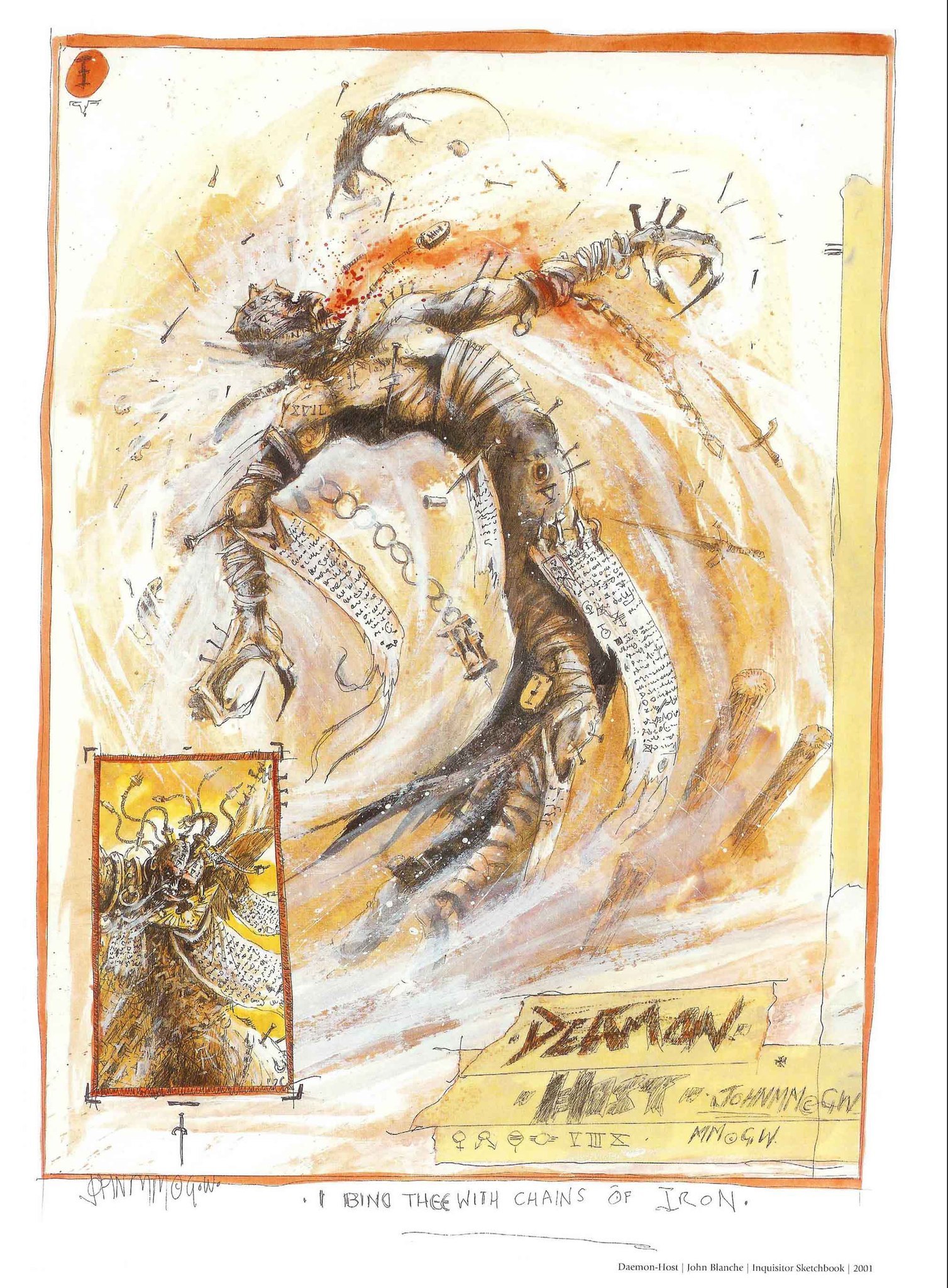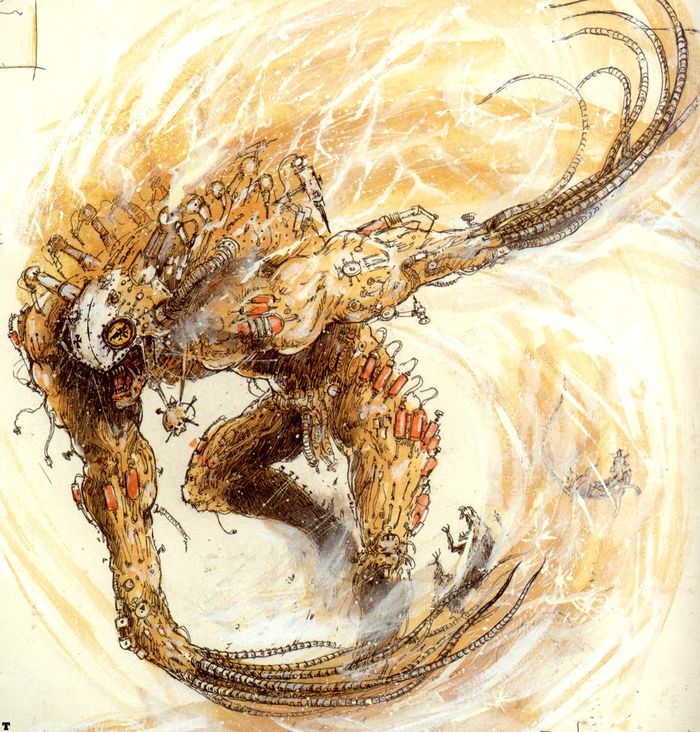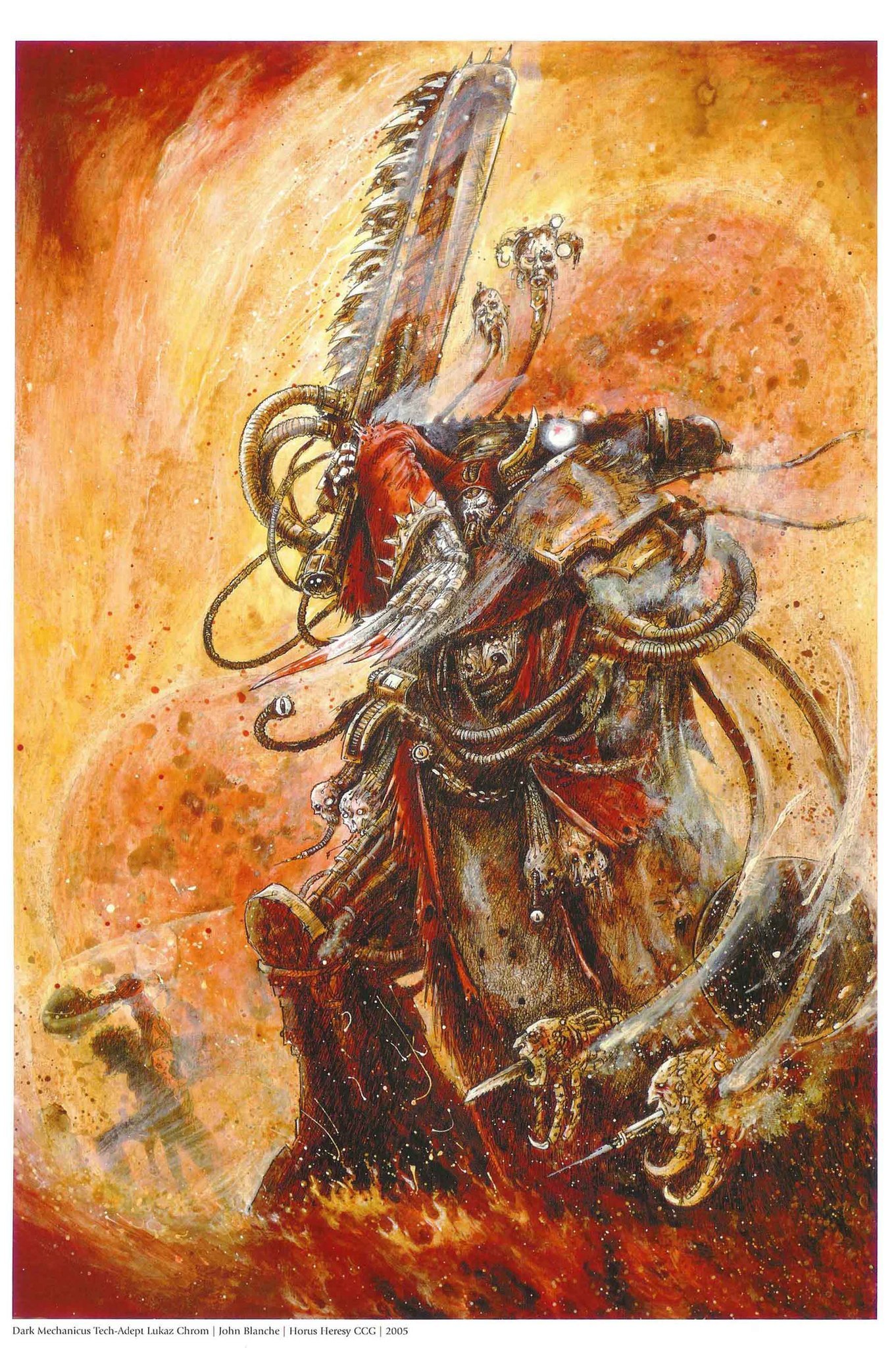In which I talk about the best thing Games Workshop ever made, how it was totally underappreciated, and how to apply some of its ideas to oldschool RPGs.
When I was a kid, I was into Warhammer, which was cool, with its big armies of goblins and skeletons and stuff. However, right about the time I was 12, Games Workshop released Inquisitor.
When I was a kid, I was into Warhammer, which was cool, with its big armies of goblins and skeletons and stuff. However, right about the time I was 12, Games Workshop released Inquisitor.
And Inquisitor, as a game (and particularly for GW) was weird.
To start with, rather than the big armies GW was known for, it was a tiny skirmish (smaller even than something like Mordheim or Necromunda), with 2-5 54mm figures on a side. These figures were unique; you didn't get a generic soldier or anything. Instead, the book gave you a bunch of setting details and then told you to come up with something cool for your characters and stat them yourself, with only a few guidelines on how to do that. And then to convert your own figures; using the miniatures out-of-the-box was rather looked down on.
The basic expectation of play was that you had a GM, and one or more players with their little warband of an imperial inquisitor and his followers, and you'd play through a custom narrative scenario to see what would happen. The game's text was pretty explicit that the point was not to win but to create a cool story from the game. You had characters doing things like disarming bombs, trying to get all the parts to summon a demon... hell White Dwarf literally published a battle report that was mostly both sides talking like adults (well, until an angry third party showed up with a chainsaw).
Oh, and the rules had a bunch of cool stuff with things like realistic injuries, psychological stats, dangerous psychics and so on. But they're less important here.
It's an interesting approach. Don't bother balancing things or trying to make character creation 'fair', just trust the players not to be dickheads and to pick interesting things rather than game-breaking things. Knowing GW's standard model (points allowances and competitive games), their playerbase didn't really know what to make of it. It got a cult following, but GW stopped supporting it after about half a decade.
I really liked it. I'd been into wargaming for a few years already. Inquisitor came into my life at about the same time D&D 3rd edition did, and I'd not really encountered RPGs before then. However, while 3rd kinda turned me off with the vast amounts of prescriptive mechanics and requirements and prerequisites getting in the way of the fun stuff... Inquisitor captured my imagination. Here's the setting. Make something cool. We trust you not to be a dick about it.
So.
What if we took that approach to RPGs? I've read a bunch of games, ranging from the avowedly old-school (I blog about OSR stuff mostly), to the weighty tomes of Vamp and its ilk, to the weird experimental art games like The Mountain Witch and Monsterhearts and so on.
What if we took that approach to RPGs? I've read a bunch of games, ranging from the avowedly old-school (I blog about OSR stuff mostly), to the weighty tomes of Vamp and its ilk, to the weird experimental art games like The Mountain Witch and Monsterhearts and so on.
All of them - all of them - have mechanics for character creation. Even in the 'pass the talking stick' story-focussed hippy games, all of the ones I've played require you to fit your character concept into the mechanical constraints of the character gen procedure.
What if this wasn't the case?
Here's how you work it. I will be using OSR games for my examples here, but you can apply it just as well to other games, too.
Here's how you work it. I will be using OSR games for my examples here, but you can apply it just as well to other games, too.
Character gen works like this:
- You come up with a character concept.
- You read the rulebook, look at what a starting PC might have, what they get as they level up, etc. What different monsters get. How it all fits together.
- You then choose all of your stats. Set your six attributes, Hit-dice, saves, class abilities to what you think is appropriate. No restrictions. Think your barbarian princess should have charisma and strength both at 18? Fucking go for it. Want to have a wizard with a spellbook who casts mostly cleric spells? Go for it. Want Turn Undead and Thief skills on your vampire-slayer? Go for it.
- So long as your character is mechanically viable (IE you've not forgotten to give her, like, hit-points or something), you can write that. It doesn't need to obey the rules of normal chargen. Give them what matches your concept, just like the GM does when designing a monster or NPC. Hell, make up abilities if there's nothing in the rules modeling what you want already.
You do all of this alongside your other players and the GM, you bounce ideas off each other and check in to make sure nobody's PC is vastly stronger/weaker than anybody else's. I'd say level 2-5 is probably your sweet spot for power. Don't worry too much about balance though.
Make characters with strengths and weaknesses and exploitable flaws and potential. Give them an interesting playstyle. Be the amateur game designer you always wanted to be.
So, how is this balanced? There are three things to bear in mind here:
1) you are not trying to win, you're trying to create an interesting character.
1) you are not trying to win, you're trying to create an interesting character.
2) nobody has to play with you if you're a powergaming dick.
3) if you are being a powergaming dick, then the GM (and to a lesser extent the other players) need to solve that as a social thing by talking about expections like fucking adults.
Like, obviously this is a thing you do if you're all on the same page. If you are playing with somebody who will willfully go against the social contract of the game so they get to feel they 'win' a non-competitive venture, that person is an asshole. Why are you playing with them?
So that's character gen. Now, in play things work basically the same. Follow the normal procedures and methods that you normally would, with a few exceptions.
Find a fun Death & Dismemberment/Critical Wound/Injury table, or something. I put a fun one in WP&WS, I'm putting another fun one in Esoteric Enterprises. WHFRP and the 40kRPGs have some pretty great ones too. Hack the game so that taking damage (or taking enough) damage inflicts a relevant wound on you. Off the top of my head 'any damage roll that does more than [the max on your Hit Die] also inflicts a Wound on you' works.
So that's character gen. Now, in play things work basically the same. Follow the normal procedures and methods that you normally would, with a few exceptions.
Find a fun Death & Dismemberment/Critical Wound/Injury table, or something. I put a fun one in WP&WS, I'm putting another fun one in Esoteric Enterprises. WHFRP and the 40kRPGs have some pretty great ones too. Hack the game so that taking damage (or taking enough) damage inflicts a relevant wound on you. Off the top of my head 'any damage roll that does more than [the max on your Hit Die] also inflicts a Wound on you' works.
You do not earn XP. You only advance by Doing Tangible Stuff in game. In D&D, the fighter finds a magic sword, the wizard loots a spellbook, the cleric makes dark pacts with horrible inhuman things they encounter for more spells (if your cleric isn't a boggle-eyed cultist loony worshipping something creepy, it is boring and I will judge you). Maybe you drink from a magic fountain for +1 wisdom. Maybe you eat the heart of a dragon and it grants you DRAGON BLOOD (whatever that does). In vampire the masquerade, there is already a wonderful mechanic for this called Diablarie; playing a sabbat pack who's only mechanical advancement is by diablerizing their enemies would be cool as fuck.
Basically, events in world can make your character weaker or stronger based on what happens to them, but it's in response to specific events; there isn't the expectation that you'll gain levels.
(I have, incidentally, played in a 6-year-long Larp that used that method of character advancement: the only way to get stronger than the standard mortal you started out as was by getting blessed by the gods or doing magic experiments on yourself or being turned into a monster. No XP. No expectation of advancement except for what you did in world. It worked brilliantly).
So, why play this way? A few reasons:
- I fucking HATE character gen minigames. Like I've gotten really good at bending the oWoD character gen to let me make a specific concept, but fuck it. Let's just write up the stats for what we want to play as, this isn't a fucking competitive venture and even if it was the balance provided by character gen rules is always laughably terrible.
- Getting Cool Stuff feels more special. When you're on the mechanical treadmill of constantly gaining XP and new NUMBERS or ABILITIES it looses its luster fast. Sometimes, having to earn improvements feels that much more satisfying. (This feels to me like you have a 'automatic vs earned advancement' scale with XP-for-showing-up-to-the-session at one end, and XP-for-Gold like OSR stuff uses towards the other. And then this is even further on the 'earn your shit' end than XP-for-gold even).
- You get to just play what you want without needing to give a shit about 'but to get more NUMBERS I need this' which an XP system looms over you. So there's an immersion benefit.
- The design space for this is TOTALLY UNEXPLORED. Like, maybe one of the pass-the-talking-stick games does this, but playing something fairly traditional like D&D or WoD this way? I've never seen it written about.
- Honestly, GW went out on a limb with Inquisitor and did something weird and arty and experimental. Let me reiterate that. Games-fucking-money-grubbing-Workshop went out on a limb to do something weird and experimental. And the ideas in it never really went anywhere because there's a prevailing consensus that of course RPGs have restrictions on character gen and advancement and you can't trust PCs not to be munchkins you have to constrain them for their own good and FUCK THAT Inquisitor deserved to be way more influential and critically recognised than it was.
And, yeah. I've never actually played this. It's just a thought experiment that I might institute when I next run a game or I might not (because fiddling with what gives XP as a way to shape PC personalities is a favourite mechanic of mine). Let me know what you think.
Also some of the art for Inquisitor was fucking badass. Look at this shit.
Also some of the art for Inquisitor was fucking badass. Look at this shit.
Fuck I loved this game an unreasonable amount.






I was also super into GW stuff around that age, Inquisitor must have passed me by but it sounds awesome.
ReplyDeleteAs for Character Advancement Through In-World Stuff Only, I'm doing that for my current game, and the setting I'm writing up. There are vampires and it's super tempting to get bit because it's one of the only ways to get magic. It's so much fun!
That kind of advancement is one of the best things about RPGs anyway. Got no time for a level system tbh
I have played almost-this. It was a one-on-one game using 2e AD&D as our base. We kinda used traditional character advancement, but since our PC was a magic-user and magic-users got their magic from pacts with demons and devils, the real power came from politics and interpersonal interactions. It was fucking awesome.
ReplyDeleteSounds intriguing. Thanks for the summary of how to do it. I’ve a group who I think would enjoy mucking around with this. And the art is *very* cool.
ReplyDelete"It got a cult following, but GW stopped supporting it after about half a decade"
ReplyDeleteWell, this is the story of all GW games that are not WFB or W40k ... ^^
love that top picture of a rat acing the half human half tree voodoo gimp. Straight out the Monty Python and the Holy Grailiverse.
ReplyDeleteInquisitor was so awesome. One of the coolest things GW has ever done. Some of their earlier works, like the original Realms of Chaos books, got some of the same world-building scope, but nothing like the gameplay.
ReplyDeleteThere's actually a pretty cool community (INQ28) that's grown up around the concepts of Inquisitor, but using more common 28mm Models rather than the unwieldy 54mm Models Inquisitor was conceived for. There's been some really excellent stuff coming out of those groups.
Really interesting thoughts.
ReplyDeleteI had bought Inquisitor as a birthday present for myself, and while I did use it to master a few storytelling wargames with my 28mm collection, I never really got itno it.
...argh...I pressed publish by accident because of my big thumbs...
ReplyDeleteAdd: I do agree with you that Inquisitor is a real gem of a wargame. A sandbox that leads into a completely new and undiscovered realm of storytelling games with miniatures.
Only the (at that time very expensive and difficult to get) scale was something I did not like at all-even though the conversions Ive seen are bloody brilliant! And on a second thought, it also lacked a steadier supply on background material.
I love this post! It's so great to find someone with a like-minded perspective towards RPG gameplay.
ReplyDeleteI had been involved with GW games since the mid-nineties but was always more interested in telling stories with smaller bands of miniatures than massive battles.
I had just left home when Inquisitor was released and was instantly hooked because it had everything I was looking for in a game. The mechanics were a little clunky but easily smoothed over with the Rule of Cool and Story is King ethos. In the beginning though, in the games in-store, we had plenty of power-gaming dicks trying to 'win' and a less-than-competent GM with no campaign ideas which ruined the party for the rest of us. However, as the chaff lost interest and moved back to the games that are meant to be competitive, the last of us closed ranks and actually ran a pretty decent and enjoyable story.
Personally I love the idea of a pen-and-paper RPG having a free-form character design alongside an event-based earning XP framework. I think such a game could be spectacular!
You've got another blog watcher.